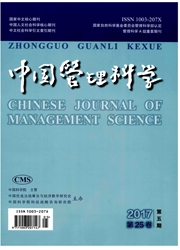

 中文摘要:
中文摘要:
本文利用中国医药生物制品上市公司2003年1季度一2012年1季度的季度财务数据进行了验证性因子分析,构建了差异化和低成本两个因子以反映公司的竞争战略。在此基础上,利用向量自回归(VAR)和脉冲响应的思路考察了战略制定及实施后企业的绩效表现,确定了战略绩效的滞后程度。研究发现:竞争战略影响企业绩效表现出一定的时滞效应;且差异化战略影响企业绩效的滞后期长于低成本战略;同时竞争战略影响企业绩效具有持续性,即竞争战略能够给企业带来持续的竞争优势,且差异化战略影响企业绩效的持续时间相比低成本战略也更长。最后,实证结果还发现,在医药生物制品行业,差异化战略相比低成本战略实施难度更大,风险更高,实施成功的可能性越小。
 英文摘要:
英文摘要:
In this paper, the time-lag effect of competitive strategy on the enterprise performance has been theoretically and empirically analyzed by using quarterly financial data of Chinese listed companies from 2003 to 2012 in medical biological industry. Confirmatory factor analysis method is used to construcl dif- ferentiation and low-cost to be the proxy factors to reflect competitive strategy, and the types of strategies and the performance after implement these strategies are studied. Further, the time-lag effect of these strategies are studied. The results show that the enterprise performance is generated after the implementa- tion of the specific competitive strategy, and there is an interval of time between the performance genera-tion and the implementation of the strategy. This time-lag effect are differently characterized by the differ- entiation strategy and low cost strategy, both the lag period and sustainability of the differentiation strate- gy is longer than that of the low cost strategy. Meanwhile, compared to the low cost strategy, the differ- entiation strategy is more difficult to be successfully implemented and suffers more risk and lower success rate in medical biological industry.
 同期刊论文项目
同期刊论文项目
 同项目期刊论文
同项目期刊论文
 Health care expenditure and GDP in African countries: evidence from semiparametric estimation with p
Health care expenditure and GDP in African countries: evidence from semiparametric estimation with p Consumption and portfolio rules for sophisticated individuals with stochastic quasi-hyperbolic disco
Consumption and portfolio rules for sophisticated individuals with stochastic quasi-hyperbolic disco Democracy, financial openness and global carbon dioxide emissions: Heterogeneity across existing emi
Democracy, financial openness and global carbon dioxide emissions: Heterogeneity across existing emi Working Capital Management, Corporate Performance, and Strategic Choices of the Wholesale and Retail
Working Capital Management, Corporate Performance, and Strategic Choices of the Wholesale and Retail Relationship between Strategic Risk and Return based on Ordinal Space: Panel Data Analysis on the Ch
Relationship between Strategic Risk and Return based on Ordinal Space: Panel Data Analysis on the Ch Random matrix theory analysis of cross-correlations in the US stock market: Evidence from Pearson&am
Random matrix theory analysis of cross-correlations in the US stock market: Evidence from Pearson&am Hyperbolic discounting predicts subadditive discounting for sophisticated and partially naive agents
Hyperbolic discounting predicts subadditive discounting for sophisticated and partially naive agents A decision engineering method to identify the competitive effects of working capital: a neural netwo
A decision engineering method to identify the competitive effects of working capital: a neural netwo Statistical Properties of the Foreign Exchange Network at Different Time Scales: Evidence from Detre
Statistical Properties of the Foreign Exchange Network at Different Time Scales: Evidence from Detre GBOM-oriented management of production disruption risk and optimization of supply chain construction
GBOM-oriented management of production disruption risk and optimization of supply chain construction 期刊信息
期刊信息
